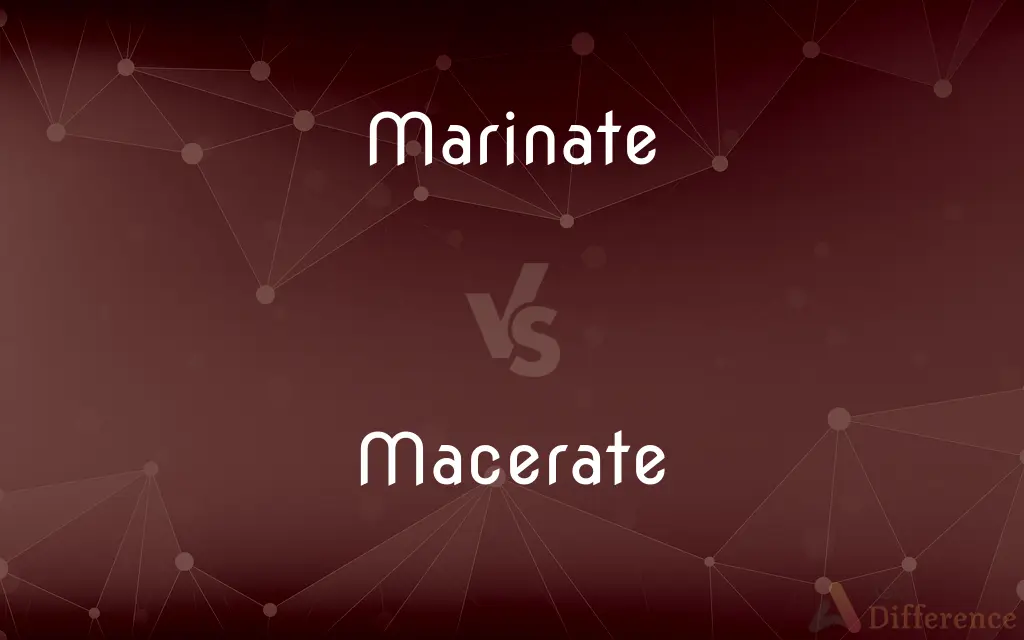Marinate vs. Macerate — What's the Difference?
Edited by Tayyaba Rehman — By Fiza Rafique — Updated on April 6, 2024
Marinate involves soaking food in a seasoned liquid to enhance flavor and tenderize, focusing on savory dishes, while macerate means softening or breaking down food with liquid, often involving sugar and fruits to draw out flavors.

Difference Between Marinate and Macerate
Table of Contents
ADVERTISEMENT
Key Differences
Marinating is a culinary technique primarily used to enhance the flavor and tenderness of meats through soaking in a seasoned liquid or marinade. This liquid often contains acids, like vinegar or lemon juice, and oils, along with herbs and spices. The acid helps in tenderizing the meat by breaking down its fibers, whereas the herbs and spices infuse it with flavors. On the other hand, macerating is a process that involves soaking food, typically fruits, in a liquid to soften them and enhance their natural flavors. Sugar, liqueur, or lemon juice can be used as macerating liquids, drawing out the fruits' juices and sweetening them, making this technique especially popular in dessert preparation.
While marinating can last from a few hours to several days, depending on the recipe and meat type, allowing flavors to deeply penetrate the meat, macerating usually takes a shorter time, often just a few hours. This is because the goal is to soften the fruit and intensify its flavor without making it mushy. For example, marinating chicken overnight will prepare it for cooking, enhancing its flavor and tenderness, whereas berries might be macerated for a few hours to mix into a dessert.
The process of marinating often requires refrigeration to prevent bacterial growth during the soaking period, especially with raw meats. In contrast, fruits being macerated are typically covered and left at room temperature, as the sugar and alcohol (if used) help preserve the fruit and enhance flavor extraction without the risk of bacterial growth.
Marinate's purpose extends beyond flavoring to tenderizing, making tougher cuts of meat more palatable and enjoyable. It is a preparatory step in the cooking process. Macerate, however, is primarily about flavor enhancement and texture modification, often serving as both a preparatory and finishing step in recipes, particularly desserts.
Marinate emphasizes the interaction between meat and a liquid solution to achieve a desired culinary texture and flavor. In contrast, macerate focuses on the gentle softening of food, especially fruits, to incorporate flavors or create a syrupy base, highlighting the versatility of liquids in enhancing or transforming food.
ADVERTISEMENT
Comparison Chart
Primary Use
Enhancing flavor and tenderness of meats
Softening and flavoring fruits
Key Ingredients
Acids (vinegar, citrus juice), oils, herbs, and spices
Sugar, liqueur, lemon juice
Purpose
Flavor enhancement and tenderizing
Flavor enhancement and softening
Typical Foods
Meats
Fruits
Duration
Hours to days
Usually a few hours
Compare with Definitions
Marinate
Using acids to tenderize meat.
Lemon juice in the marinade helps to break down the meat fibers.
Macerate
Softening fruits with sugar.
Macerating strawberries in sugar draws out their natural juices.
Marinate
Soaking meat in a seasoned liquid.
He decided to marinate the steak overnight to ensure it was flavorful and tender.
Macerate
Creating a syrupy base for dishes.
Macerated fruit juices served as a base for the cocktail.
Marinate
Enhancing meat's flavor before cooking.
Marinating chicken in herbs and spices adds depth to its taste.
Macerate
Preparing fruits for desserts.
The chef macerated berries for the fruit tart topping.
Marinate
Preparing meat for grilling, roasting, or frying.
She marinated the pork before barbecuing it.
Macerate
Enhancing the natural flavor of fruits.
Macerating peaches in wine elevates their sweetness.
Marinate
A blend of culinary traditions and techniques.
They explored different marinades to celebrate their diverse culinary heritage.
Macerate
Technique to preserve or prepare fruits.
Macerating cherries in brandy preserved them for winter.
Marinate
Soak (meat, fish, or other food) in a marinade
The beef was marinated in red wine vinegar
Macerate
To make soft by soaking or steeping in a liquid.
Marinate
To soak (meat, for example) in a marinade.
Macerate
To separate into constituents by soaking.
Marinate
To become marinated.
Macerate
To cause to become lean, usually by starvation; emaciate.
Marinate
(ergative) To allow a sauce or flavoring mixture to absorb into something; to steep or soak something in a marinade to flavor or prepare it for cooking.
You'll get a better flavour from the chicken if you marinate it first.
After the chicken has marinated for two hours, discard the remaining marinade.
Macerate
To become soft or separated into constituents by soaking
"allowed the juice and skins of the white grapes to macerate together overnight before pressing" (Gerald Asher).
Marinate
(intransitive) Of ideas or feelings, to mentally develop over time
Macerate
A substance prepared or produced by macerating.
Marinate
To salt or pickle, as fish, and then preserve in oil or vinegar; to prepare (food) by the use of marinade.
Macerate
To soften (something) or separate it into pieces by soaking it in a heated or unheated liquid.
Marinate
Soak in marinade;
Marinade herring
Macerate
(archaic) To make lean; to cause to waste away.
Macerate
(obsolete) To subdue the appetite by poor or scanty diet; to mortify.
Macerate
(obsolete) To mortify the flesh in general.
Macerate
A macerated substance.
Macerate
To make lean; to cause to waste away.
Macerate
To subdue the appetites of by poor and scanty diet; to mortify.
Macerate
To soften by steeping in a liquid, with or without heat; to wear away or separate the parts of by steeping; as, to macerate animal or vegetable fiber.
Macerate
Separate into constituents by soaking
Macerate
Become soft or separate and disintegrate as a result of excessive soaking;
The tissue macerated in the water
Macerate
Soften, usually by steeping in liquid, and cause to disintegrate as a result;
Macerate peaches
The gizzards macerates the food in the digestive system
Macerate
Cause to grow thin or weak;
The treatment emaciated him
Common Curiosities
Is sugar always necessary for macerating?
While sugar is commonly used, macerating can also involve liquids like liqueurs or acids, depending on the desired outcome.
What is the purpose of marinating?
Marinating is used to enhance the flavor and tenderness of meats before cooking.
What's the difference in liquid used for marinating vs. macerating?
Marinating liquids often include acids and oils, while macerating liquids typically consist of sugar and/or alcohol.
How does macerating affect fruits?
Macerating softens fruits and enhances their flavors by drawing out their natural juices.
What happens if you marinate meat for too long?
Over-marinating can make the meat too soft or alter its texture negatively.
Can marinating make all cuts of meat tender?
While marinating helps, some tough cuts may still require slow cooking methods for tenderness.
Can vegetables be marinated or macerated?
Yes, vegetables can be marinated to enhance flavor and sometimes macerated, especially for use in salads or desserts.
Do you need to refrigerate meat while marinating?
Yes, to prevent bacterial growth, meat should be refrigerated during marination.
Can marinate be used as a noun?
Yes, "marinade" is the noun form, referring to the liquid in which the meat is soaked.
How long should meat be marinated?
Meat can be marinated for a few hours to several days, depending on the meat type and recipe.
Is it possible to over-macerate fruits?
Yes, over-macerating can make fruits too mushy, losing their texture and becoming overly sweet.
Can maceration be used as a preservation method?
Yes, especially when combined with alcohol or sugar in high concentrations, maceration can preserve fruits.
How does macerating differ from simply soaking in water?
Macerating involves using liquids that draw out flavors or create a syrupy texture, unlike plain water.
Why are acids used in marinades?
Acids help to tenderize meat by breaking down its fibers, making it more tender.
Can dairy products be used in marinades?
Yes, dairy products like yogurt are used in some marinades to tenderize and add flavor.
Share Your Discovery

Previous Comparison
Weasel vs. Fisher
Next Comparison
Milestone vs. PhaseAuthor Spotlight
Written by
Fiza RafiqueFiza Rafique is a skilled content writer at AskDifference.com, where she meticulously refines and enhances written pieces. Drawing from her vast editorial expertise, Fiza ensures clarity, accuracy, and precision in every article. Passionate about language, she continually seeks to elevate the quality of content for readers worldwide.
Edited by
Tayyaba RehmanTayyaba Rehman is a distinguished writer, currently serving as a primary contributor to askdifference.com. As a researcher in semantics and etymology, Tayyaba's passion for the complexity of languages and their distinctions has found a perfect home on the platform. Tayyaba delves into the intricacies of language, distinguishing between commonly confused words and phrases, thereby providing clarity for readers worldwide.














































